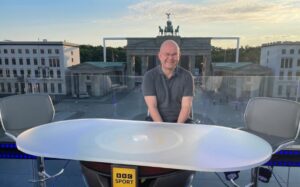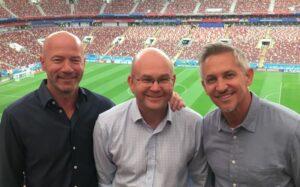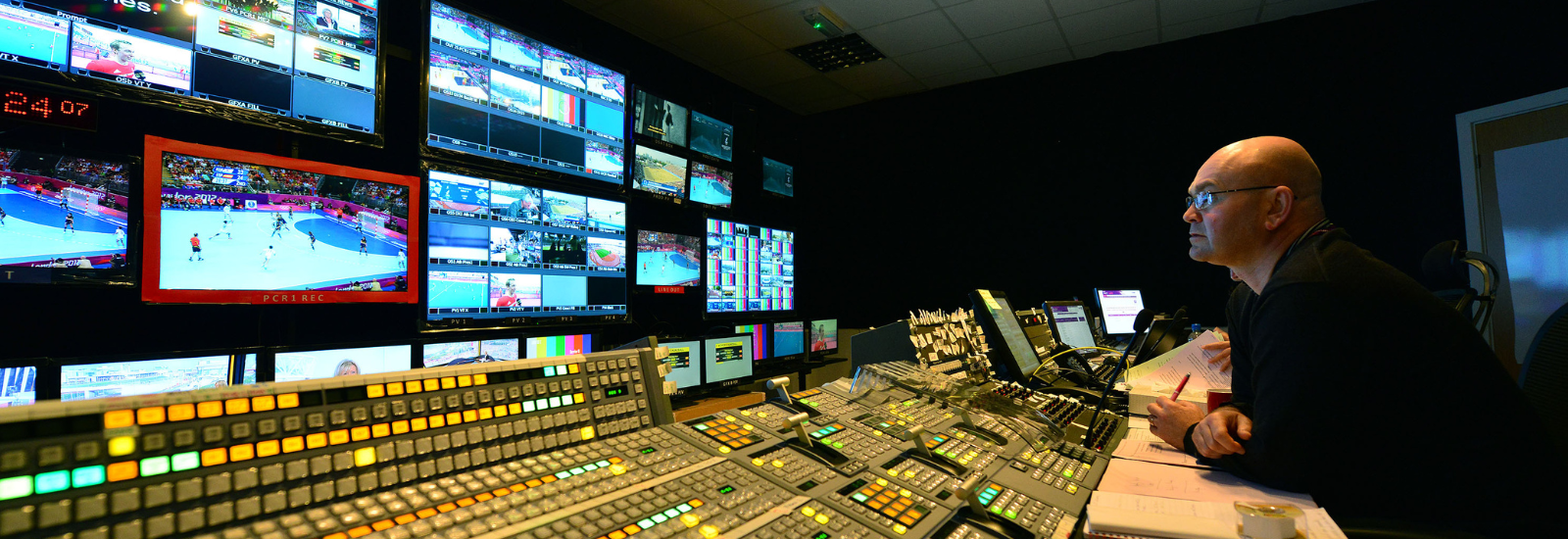Following a nail-biting final for England fans, University of Reading graduate and BBC Sport producer, Phil Bigwood, chatted all things Reading and sports with CONNECTED.
From winning trophies for St Andrew’s Hall, to Match of the Day, the Olympics, World Cups and UEFA Euro 2024 – Politics and International Relations graduate and BBC Sport producer, Phil, doesn’t take his dream job for granted, even thirty years on.
A serendipitous start
 After graduating, Phil was unsure of his career path but knew he wanted to work in sports. His journey after Reading began with a firm of American architects designing Liverpool Street station in London, but he soon found his way to the BBC. Phil explained: “I started phoning and writing to various BBC sport departments around the country, asking if I could see how things worked and if there were any job openings.
After graduating, Phil was unsure of his career path but knew he wanted to work in sports. His journey after Reading began with a firm of American architects designing Liverpool Street station in London, but he soon found his way to the BBC. Phil explained: “I started phoning and writing to various BBC sport departments around the country, asking if I could see how things worked and if there were any job openings.
“I would have done anything, I just wanted to work in sport and hopefully work my way up from there. Eventually, a job as a clerk at BBC Sport in Shepherd’s Bush, West London opened up and that was my foot in the door.”
Phil progressed from a clerk to a floor manager, then to assistant producer and eventually became an executive producer in the early 2000s. Phil said: “The BBC has been amazing for me. Once you’re in, it’s possible to work your way up, and I was able to benefit from a series of six month attachments – which allows you to try different roles – and gave me an introduction into the world of TV production. I absolutely loved it and knew that was what I wanted to do going forward.
“I was actually offered a more senior role in admin but I’d got a taste for the production side of things while trying out floor management. So, when a role for assistant producer came up, I went for it – and the rest is history.”
Career highlights
 Phil has been responsible for the production elements of the BBC’s Euro 2024 coverage in Germany which kicked off in June. Of watching England’s recent semi-final and final games, Phil said: “The Euros was a really special event for me. I was lucky enough to be in the stadium in Dortmund for the semi-final – it was quite a moment when Ollie Watkins scored so late in the game. The atmosphere was incredible and it’s fair to say the BBC team were very happy!
Phil has been responsible for the production elements of the BBC’s Euro 2024 coverage in Germany which kicked off in June. Of watching England’s recent semi-final and final games, Phil said: “The Euros was a really special event for me. I was lucky enough to be in the stadium in Dortmund for the semi-final – it was quite a moment when Ollie Watkins scored so late in the game. The atmosphere was incredible and it’s fair to say the BBC team were very happy!
“The final unfortunately didn’t quite deliver and obviously the defeat to Spain was a huge disappointment to everyone. It was a shame, the whole nation was watching and we – like everyone – obviously hoped for that elusive and historic moment. But sometimes it isn’t meant to be and Spain deserved to win.”
Throughout the Euros Phil led on the studio plans in Berlin, liaised with UEFA on production plans, was involved in the talent decisions, budget and TV scheduling as well as various other elements such as the logistical planning, health and safety, titles and the technical delivery.
Phil explained: “The production planning typically starts about three years prior to a major tournament like this. During this year’s Euros we tried to minimise travel and the number of people travelling by handling most of the production facilities in Salford, despite having our studios in Berlin. It’s a split operation which makes it very technical and complex – but it’s really important we try to be as sustainable as possible.”
Phil’s career at BBC Sport has been full of memorable moments, having produced coverage for numerous major events, including every FIFA World Cup from 2002 to 2022, with planning for 2026 already underway. He’s also produced coverage for the UEFA European Championships from 2004, the 2012 and 2014 London Olympics, as well as cricket, heavyweight title fights, cycling, snooker, darts and even water-skiing. A personal highlight for Phil has been working on Match of the Day.
Phil said: “Working alongside some of my sporting heroes has been amazing. Even after working on it for years, I never get blasé about it.
“The buzz of live broadcasting and knowing the whole country is watching is unmatched. Yes, it can be pressurised and fraught, but the reward when a programme goes well can’t be beaten”
Phil’s proudest moments have come from working on these major events. He explained: “As Executive Producer, you’re captain of the ship, trying to get everyone working together as a team to create the best programmes possible.
“It’s a huge team effort and as someone who wasn’t particularly confident growing up, I never thought I’d be the one guiding the TV coverage or directing some of the biggest programmes on British television. It’s just as well I work with a great team.”
Things became even more special for Phil when the BBC’s 2018 World Cup coverage of the quarter-final between England and Sweden won a BAFTA. He said: “Winning was entirely a team effort and I don’t class the BAFTA as my own, but it was still a really memorable moment in my career.
“On the evening of the awards ceremony I had jokingly agreed to go and receive the award if we won, never thinking we actually would!
“Suddenly the announcement was made and I was walking from the back of the auditorium with my colleagues towards the stage to collect the award thinking ‘what am I going to say’.
“Like a lot of people, I hate public speaking, so on top of the award it was a really proud moment to have come up with something to say on the spot. To have spoken on live TV, in front of a huge crowd, with celebrities in the front row, wasn’t something I’d have ever imagined myself doing.” Phil went on to win a second BAFTA for his work on the Women’s Euros in England in 2022.
Gaining confidence
Although Phil is now comfortable within his senior role at the BBC, he admits that he wasn’t always that confident. Phil said: “As a type one diabetic from the age of ten, my parents really worried when I went to university, as it was my first time away from home.
“But it made me realise that even with health issues, anything was possible. Going to Reading was the best decision I could have made!
“I have so many fond memories of Reading – from staying up all night before exams studying, parties, St Andrews Hall, to boat trips along the Thames in Caversham. I made friends for life at Reading – most of whom came out to join me at the Euros. To still be meeting up 40 years after we first met is really special.”
“I even did a bit of sport myself during my time at Reading. I played football for the St Andrew’s hall of residence team, I was never any good but we did win a few trophies. I’d never have thought then that I’d end up working for BBC Sport – but I’m definitely better at watching than playing!”
For students and graduates aspiring to enter the sports production industry, Phil emphasises the importance of gaining experience and being proactive.
He explained: “It’s a competitive field so it’s important to demonstrate that you’re prepared to put the work in. You can volunteer with local clubs and report on their matches, write a blog, or start a YouTube channel. Show that you’re making an effort. There’s so much out there now media wise and a variety of ways to broaden your skills with the likes of social media and podcasts.
“Do whatever you can to build up a portfolio and – above all – keep persevering whatever the knockbacks.”
He also advises narrowing down specific interests within the industry. Phil said: “Whether it’s being behind the camera or in front of it, writing or technical support – focus on what you enjoy most. The industry is vast, and finding your niche can help you make a mark.”
Did you find your dream job after graduating from Reading? Share your story with us by e-mailing: alumni@reading.ac.uk







